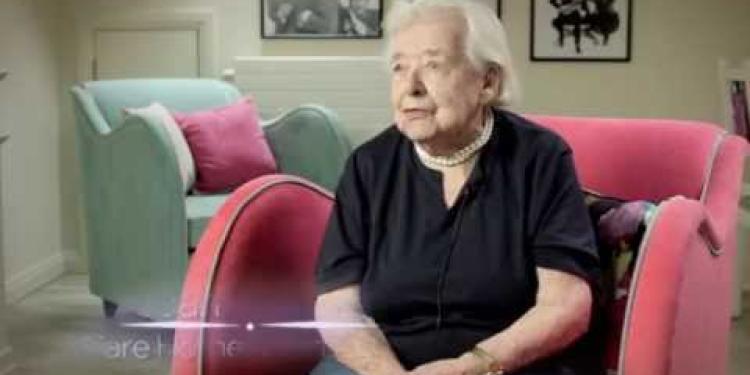Important Information On Using This Service
- Ergsy carefully checks the information in the videos we provide here.
- Videos shown by YouTube after a video has completed have NOT been reviewed by ERGSY.
- To view, click the arrow in the center of the video.
Using Subtitles and Closed Captions
- Most of the videos you find here will have subtitles and/or closed captions available.
- You may need to turn these on and choose your preferred language.
Turn Captions On or Off
- Go to the video you'd like to watch.
- If closed captions (CC) are available, settings will be visible on the bottom right of the video player.
- To turn on captions, click settings.
- To turn off captions, click settings again.
Find A Professional
More Videos of Interestdiagnosis
The Role of Care Homes Dedicated to Caring for People Living with Dementia and Memory Loss
Personalised Care Plans
Care homes that specialise in dementia and memory loss provide personalised care plans tailored to each resident's unique needs and preferences. Trained caregivers conduct thorough assessments to understand each individual’s cognitive abilities, personal history, and likes and dislikes. These insights shape daily routines and activities designed to enhance quality of life and promote comfort and familiarity.Specialised Training and Expertise
Staff in dementia care homes receive specialised training to understand the complexities of dementia and memory loss. This expertise enables them to manage the unique challenges associated with different forms of dementia, including Alzheimer's disease. They are skilled in communication techniques, behavioural management, and providing emotional support, which is crucial for maintaining residents' dignity and well-being.Safe and Secure Environment
Care homes dedicated to dementia provide safe and secure environments tailored to the needs of their residents. Features might include secure premises to prevent wandering, clear signage to aid navigation, and calming decorations to reduce anxiety and confusion. The physical environment is designed to be both safe and stimulating, promoting residents’ independence while ensuring their safety.Meaningful Activities and Engagement
Engaging activities play a pivotal role in dementia care homes. These activities are designed to stimulate the mind, promote physical health, and foster social interactions. Whether it’s reminiscence therapy, music sessions, gardening, or gentle exercise, these activities help maintain cognitive function and provide a sense of purpose and joy.Support for Families
Care homes also offer crucial support for the families of those living with dementia. This support can take many forms, from regular updates and communication to providing educational resources and support groups. By involving families in the care process, homes help maintain strong connections between residents and their loved ones, easing the emotional burden for all involved.End-of-Life Care
In the later stages of dementia, specialised care homes provide compassionate end-of-life care. This includes pain management, emotional support, and ensuring that the resident's final days are as comfortable and dignified as possible. Staff work closely with families during this time to provide needed support and reassurance. Daily life in a care home dedicated to dementia and memory loss care is intricately designed around the needs of the residents to ensure that they receive compassionate, effective care that improves their quality of life.Frequently Asked Questions
What is a dementia care home?
A dementia care home is a specialised residential facility providing tailored care, support, and services to individuals living with dementia and memory loss. These homes offer a safe and structured environment where residents can receive 24-hour assistance.
How do I know if a dementia care home is the right choice for my loved one?
A dementia care home might be the right choice if your loved one requires specialised care that is difficult to provide at home, such as constant supervision, help with daily activities, and addressing behavioural challenges associated with dementia.
What types of services do dementia care homes offer?
Dementia care homes offer services including 24-hour supervision, personal care assistance, medical care, social and recreational activities, memory therapies, and emotional support.
Are there different types of dementia care homes?
Yes, there are different types, including residential care homes, nursing homes, and specialist dementia care units within larger care homes. Each offers varying levels of care and support depending on the needs of the residents.
How are staff trained in a dementia care home?
Staff in dementia care homes undergo specialised training to understand dementia, manage symptoms, use appropriate communication techniques, and provide person-centred care tailored to each resident's needs.
What kind of activities are available for residents in dementia care homes?
Activities may include music therapy, art therapy, memory games, physical exercises, outdoor walks, social interaction sessions, and other activities designed to stimulate cognitive and emotional engagement.
How can I choose the right dementia care home for my loved one?
When choosing a care home, consider the level of care needed, location, quality of facilities, staff qualifications, resident reviews, and specific dementia care programmes offered. Visiting prospective homes and speaking with administrators and staff can also be helpful.
What should I expect during the admission process?
The admission process typically involves an initial assessment of the resident's needs, a tour of the facility, discussions about care plans, understanding costs, and completing necessary paperwork. Staff will help make the transition as smooth as possible.
How much does a dementia care home cost in the UK?
Costs vary widely depending on location, level of care, and services provided. On average, dementia care home fees in the UK can range from £500 to £1,500 per week. Financial assistance and funding options may be available.
Can residents bring personal belongings to the care home?
Yes, residents are generally encouraged to bring personal belongings such as photographs, furniture, and keepsakes to make their new environment more familiar and comfortable.
How are medical needs managed in a dementia care home?
Medical needs are managed by trained staff and healthcare professionals who provide regular health assessments, administer medications, coordinate with doctors, and ensure that residents receive appropriate medical care.
What measures are in place for safety and security?
Dementia care homes implement various measures to ensure safety and security, including secure premises, regular monitoring, fall prevention strategies, and staff training on emergency procedures.
How do dementia care homes support the emotional well-being of residents?
Emotional well-being is supported through personalised care plans, therapeutic activities, social interaction, familial involvement, and creating a comforting and familiar environment for residents.
Can family and friends visit residents in a dementia care home?
Yes, family and friends are usually encouraged to visit regularly to maintain relationships and provide emotional support. Each care home will have its own visiting policies and schedules.
How can I stay informed about my loved one's care and well-being?
Care homes typically provide regular updates through meetings, reports, and direct communication with staff. Many homes encourage family involvement in care planning and decision-making.
Useful Links
Useful links from: The role of residential and nursing homes
- NHS: Care homes The NHS guide provides an overview of care homes, including the types of care homes available, the services provided, and how to choose the right one.
- Age UK: Care homes Age UK offers detailed advice on different types of care homes, how to fund your stay, and finding the right care home for your needs.
- Alzheimer's Society: Moving into a care home The Alzheimer's Society provides specific information on moving into a care home, especially for people living with dementia and their families.
- NHS: How to get social care and support This NHS page offers guidance on getting social care and support, including eligibility, assessments, and different types of support available.
Useful links from: Impact of Rising Energy Prices on Household Budgets
- NHS - Help with health costs Information on what support is available for health-related costs and how you can access it, particularly useful for households struggling with rising energy prices.
- Citizens Advice - Help with your energy bills Citizens Advice provides practical tips and advice on managing energy bills and access to available grants and benefits.
- Turn2us - Grants Search Turn2us offers a free and easy-to-use Grant Search tool to help you find grants and funding opportunities, which can be a vital resource if rising energy costs impact your household budget.
- National Energy Action (NEA) - Warm and Safe Homes National Energy Action (NEA) provides resources and advice on how to keep your home warm and safe, targeting those who may be affected by increasing energy prices.
Useful links from: Impact of Housing Shortage on Local Communities
- NHS - Housing Shortages and Health This NHS page discusses the impact of housing shortages on health and well-being, highlighting key areas where inadequate housing can affect physical and mental health.
- Shelter UK - The Housing Emergency Shelter UK outlines the current housing crisis, its causes, and its impact on local communities. The charity also provides information on how individuals can support their campaigns and initiatives.
- Crisis UK - The Impact of Homelessness Crisis UK dives into the effects of the housing shortage, focusing specifically on how it contributes to homelessness and the broader implications for society.
- The King's Fund - Housing and Health The King's Fund provides an in-depth look at how inadequate housing affects health and well-being, using research and case studies to illustrate these impacts.
Useful links from: What is end of life care?
- NHS - End of Life Care Comprehensive guide by the NHS explaining what end of life care involves, how it is provided, and what services are available.
- Marie Curie - End of Life Care Marie Curie offers advice and support for people with a terminal illness, including information on hospice and palliative care services.
- Macmillan Cancer Support - End of Life Care Provides resources and support for individuals affected by cancer, including guidance on end of life care and making preparations.
- Hospice UK - What is Hospice Care? Hospice UK provides information on hospice care, its benefits, and how it can support individuals at the end of life.
Useful links from: Animation - Primary care and NHS 111
- NHS - How 111 Works Provides detailed information on how the NHS 111 service works, including when to use it and what happens when you call.
- NHS - NHS 111 online Official website for NHS 111 online where you can get urgent healthcare advice or help online for yourself, your child, or someone you care for.
- Healthwatch England - NHS 111 Healthwatch England provides information on what to expect when you call the NHS 111 service, including insights and advice.
- NHS - Primary Care Services Offers information on GP services as part of primary care, including how to register with a GP and what services are available.
More Videos of Interestdiagnosis
Have you found an error, or do you have a link or some information you would like to share? Please let us know using the form below.
- Ergsy carfully checks the information in the videos we provide here.
- Videos shown by Youtube after a video has completed, have NOT been reviewed by ERGSY.
- To view, click the arrow in centre of video.
- Most of the videos you find here will have subtitles and/or closed captions available.
- You may need to turn these on, and choose your preferred language.
- Go to the video you'd like to watch.
- If closed captions (CC) are available, settings will be visible on the bottom right of the video player.
- To turn on Captions, click settings .
- To turn off Captions, click settings again.





